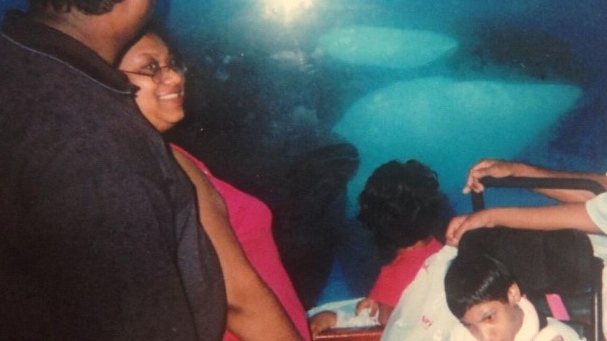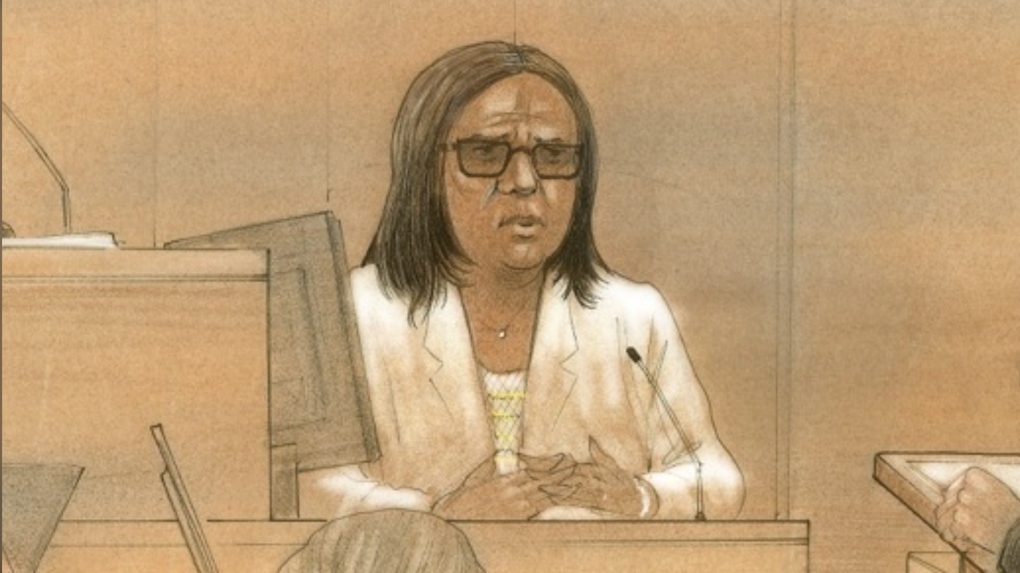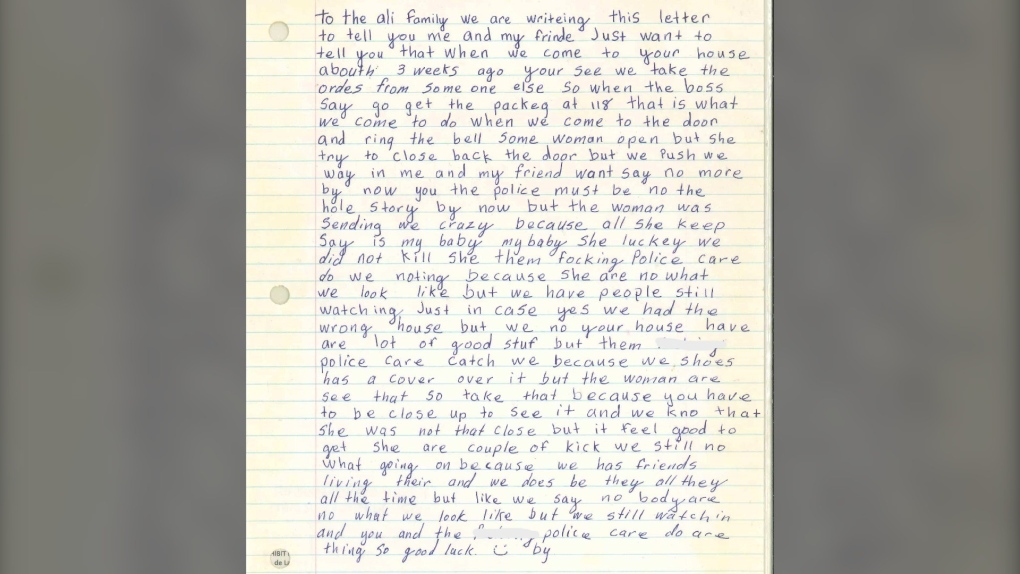Home invasion or mercy killing? Court hears final arguments in murder retrial of Toronto mother Cindy Ali
The prosecutor seeking to convict Toronto mother Cindy Ali in the 2011 death of her disabled teenage daughter said during final arguments Monday that the murder was carried out as an act of mercy to relieve the girl from suffering – a theory the defense said was “plucked from thin air” and based on stereotypes.
“This [theory] involves, to some degree, a bit of a stereotype towards the developmentally or the physically disabled, that their lives are a misery,” Cindy’s counsel, James Lockyer, suggested to Justice Jane Kelly at Toronto’s Superior Court of Justice on Monday. “It really is a full stereotype.”
Nearly eight years earlier, in the same downtown courthouse, Cindy was convicted of first-degree murder and sentenced to life with no chance of parole in connection with her daughter Cynara’s death.
- Download our app to get local alerts on your device
- Get the latest local updates right to your inbox
After appealing that conviction in 2021, Cindy was granted a new trial, which began in October, presided over by Justice Jane Kelly alone.
In both her first trial and the ongoing proceedings, Cindy has maintained that Cynara died in the aftermath of a break-and-enter carried out at their Scarborough townhouse on Feb. 19. On that day, Cindy called 911 just after 11 a.m. to report that two men dressed in all black had just broken into her home looking for a “package.”
She told police officers and, in 2016, a jury that one of the men took her from room to room, looking for the item, and that when she returned to the living room, Cynara was lifeless on the couch with the other man standing nearby, holding a pillow above her head. The two men left after claiming they'd gotten the wrong house, Cindy said. They were never found.
First responders found Cynara without vital signs in the home shortly after. She was resuscitated and brought to the hospital, where she died just over a day later.
On Monday, the prosecution, led by Crown attorney Beverley Olesko, rejected Cindy’s claim of a home invasion and instead posed to the court that she had smothered her daughter.
“This case really turns on what your Honour makes of Cindy Ali’s story of the home invasion,” Olesko began in her final arguments to the court. “However, Ms. Ali’s story should not be believed, as it was just that, a story.”
The prosecution’s primary theory was that Cindy staged her home to look as though two men had broken in in an attempt to cover up the murder of her daughter, which it alleged she carried out as an act of mercy.
Cynara, who the court heard had lived well past her life expectancy, had suffered three seizures the night before the alleged break-in. It was these seizures that caused Cindy to become fearful for her daughter’s quality of life moving forward, according to the Crown’s theory.
“There were no intruders,” Olesko said. “It was just Ms. Ali and Cynara, and it is Ms. Ali who is responsible for Cynara’s death.”
In response, Lockyer told the court that the Crown’s theory was “not humanely believable.”
“This is not acceptable at all in my submission,” he said of the suggestion. “The Crown’s theory is speculative and I’ll go so far as to say ‘rank speculation.’”
The motive was first put forth to Cindy during her cross-examination earlier this month. She rejected the suggestion in full, claiming that Cynara was the joy of their family and that she would never have taken her daughter’s life into her own hands.
"I would have never thought of that. I cared for her for 16 years," she said.
READ MORE: Mother denies killing disabled teenage daughter in suggested act of mercy at Toronto retrial
 Allan, Cindy, and Cynara Ali can be seen at Marineland in a photo shown to the jury as an exhibit in Cindy Ali's 2016 trial. (Superior Court of Justice)
Allan, Cindy, and Cynara Ali can be seen at Marineland in a photo shown to the jury as an exhibit in Cindy Ali's 2016 trial. (Superior Court of Justice)
But the prosecution did not need to dispute Cindy’s love for her daughter.
“There is no question that she loved Cynara, but it's the Crown’s position that it was her love for Cynara that caused Ms. Ali to end her life,” Olesko told the court Monday.
“Loving someone and killing them are not mutually exclusive positions,” she said.
In arguing that Cindy had fabricated the home invasion, the Crown first pointed to her conduct following the departure of the two intruders.
For example, if Cindy was so concerned for Cynara’s wellbeing, why, when the men left the home, did she not take measures beyond calling 911 to save her lifeless daughter, Olesko asked the court.
Olesko also suggested that it was clear, considering Cynara’s disabilities, that the man who Cindy said remained with Cynara “clearly could have searched the house but didn’t.”
“If finding the package was so urgent, it would only make sense that both men would search,” Olesko said. “But Cindy needed someone to blame for Cynara’s death.”
The Crown also alleged that Cindy has not always been consistent in her descriptions of the man with the pillow in the decade since Cynara's death and that, in one instance, she told paramedics that the man had been holding a pillow over Cynara's "face," rather than over her "head."
Lockyer called critiques of Cindy’s conduct unfair.
“Cindy was in an awful situation,” Lockyer said in his arguments. “I imagine her mind was racing as to how best to protect Cynara – to cooperate or struggle?”
“She would have been acting largely without thought, out of a combination of love, fear, desperation for Cynara, and - I think it might be fair to say - a degree of courage for her own,” he continued.
 Cindy Ali appears in a Toronto courthouse on Feb. 29, 2016. (John Mantha / CTV Toronto)
Cindy Ali appears in a Toronto courthouse on Feb. 29, 2016. (John Mantha / CTV Toronto)
Moving on from the alleged home invasion, the Crown also argued Cindy was the author of a letter the Ali family received in the months following Cynara's death
The letter, written in the voice of the alleged intruders and containing information only those at the scene could have been privy to, said the two men had carried out the break-in under the instruction of a "boss" but "got the wrong house."
Cindy’s husband, Allan Ali, turned that letter in to Toronto police's 42 Division the day he found it, and each member of the Ali family submitted handwriting samples. To this day, its author and origins are unknown.
According to the Crown’s theory, Cindy wrote the letter and disguised her handwriting to evade identification.
“When you look at the letter, the Crown would say there is a deliberate attempt to disguise the writing,” Olesko argued. “If there were two intruders, it wouldn’t make sense for them to write it or deliver it to the house.”
In turn, Lockyer argued the letter had to have been written by a third party and asked it not be considered by Justice Kelly in her deliberations as it was ultimately inconclusive.
“There is no evidentiary linkage between the letter to Cindy,” he said. “No prints on the letter, no DNA, no handwriting samples flagged, and if I’m right, the letter cannot at all carry any weight in this trial.”
Lockyer suggested it could have been written either by the police or by someone trying to assist Cindy, as it was found that police had been communicating a belief that Cindy had been involved in Cynara’s death to those they interviewed in February 2011.
 A letter delivered to the Ali home and taken to TPS' 42 Division about a month after Cynara's death can be seen above. To this day, its origins and author are unknown. (Superior Court of Justice Exhibit)
A letter delivered to the Ali home and taken to TPS' 42 Division about a month after Cynara's death can be seen above. To this day, its origins and author are unknown. (Superior Court of Justice Exhibit)
In his final arguments, Lockyer suggested that Toronto police’s year-long investigation into Cynara’s death, which included the interception of communications between the Alis and nearly 20 others, probes planted into their townhouse, and tracking devices implemented into their phones, turned up nothing of significance and proved an “absence of evidence” in the case.
“Despite this extraordinary investigation and this extreme focus on the Ali family, we have heard nothing about the investigation at this trial because there's nothing to tell you," he said.
Facing a lack of physical evidence, Justice Jane Kelly was urged by Lockyer to instead look to Cindy’s character and the beliefs of those closest to her.
“The system needs to give some credit to Cynara’s nearest and dearest,” he said, arguing that a family’s disbelief of a loved one’s guilt is a “common feature of domestic wrongful convictions.”
The allegations against Cindy do not just involve her, but also her husband and three remaining daughters, and carry a great stigma, Lockyer argued.
“I’m asking the court to consider taking away from Cindy and her family that she had anything to do with the death of her daughter,” he said.
“Allow her and her family to finally and properly grieve Cynara's death, along with the pastors, the congregation of her church, and all those around her.”
The retrial will resume on Jan. 19 when Justice Jane Kelly is expected to give a verdict.
CTVNews.ca Top Stories

Trump threatens to try to take back the Panama Canal. Panama's president balks at the suggestion
Donald Trump suggested Sunday that his new administration could try to regain control of the Panama Canal that the United States “foolishly” ceded to its Central American ally, contending that shippers are charged “ridiculous” fees to pass through the vital transportation channel linking the Atlantic and Pacific Oceans.
Man handed 4th distracted driving charge for using cell phone on Hwy. 417 in Ottawa
An Ottawa driver was charged for using a cell phone behind the wheel on Sunday, the fourth time he has faced distracted driving charges.
Wrongfully convicted N.B. man has mixed feelings since exoneration
Robert Mailman, 76, was exonerated on Jan. 4 of a 1983 murder for which he and his friend Walter Gillespie served lengthy prison terms.
Can the Governor General do what Pierre Poilievre is asking? This expert says no
A historically difficult week for Prime Minister Justin Trudeau and his Liberal government ended with a renewed push from Conservative Leader Pierre Poilievre to topple this government – this time in the form a letter to the Governor General.
opinion Christmas movies for people who don't like Christmas movies
The holidays can bring up a whole gamut of emotions, not just love and goodwill. So CTV film critic Richard Crouse offers up a list of Christmas movies for people who might not enjoy traditional Christmas movies.
More than 7,000 Jeep SUVs recalled in Canada over camera display concern
A software issue potentially affecting the rearview camera display in select Jeep Wagoneer and Grand Cherokee models has prompted a recall of more than 7,000 vehicles.
'I'm still thinking pinch me': lost puppy reunited with family after five years
After almost five years of searching and never giving up hope, the Tuffin family received the best Christmas gift they could have hoped for: being reunited with their long-lost puppy.
10 hospitalized after carbon monoxide poisoning in Ottawa's east end
The Ottawa Police Service says ten people were taken to hospital, with one of them in life-threatening condition, after being exposed to carbon monoxide in the neighbourhood of Vanier on Sunday morning.
New York City police apprehend suspect in the death of a woman found on fire in a subway car
New York City police announced Sunday they have in custody a “person of interest” in the early morning death of a woman who they believe may have fallen asleep on a stationary subway train before being intentionally lit on fire by a man she didn't know.


































